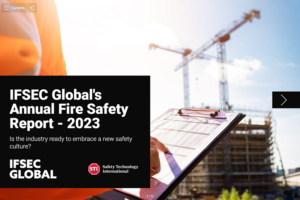Fire engineering lies at the heart of the building industry.
But more important than economic concerns is the fact that their skills and knowledge prevent tragedies. At FIREX 2016, a panel of experts discussed the future of educating the profession.
Andy Shuttleworth is a man of many talents. Apart from serving for thirty years in Strathclyde’s fire and rescue service, he has been a lecturer on Glasgow Caledonian University’s fire engineering programme since its inception.
As a serving fire officer and engineering consultant, he has first-hand experience of the importance of competent fire engineering.
“A topical example is a new-build block of flats three or four miles from here [London’s Excel conference venue],” he says. “It’s six years old and families have been moved out, for refurbishment and demolition, because of issues with passive fire protection. That should never have happened.”
Shuttleworth highlights the need for new talent in the fire engineering pool as being the highest for a generation: “I imagine fire engineer graduates leaving college and wanting to get involved in projects like the Shard, at the top end of the market. Yet we have the greatest need for affordable housing in this country since the second world war.
“As a fire officer with 30 years’ experience, I often had to deal with the fallout from housing that was built as quickly, cheaply and conveniently as possible. So I think fire engineers of today have an absolute moral imperative to make sure tragedies don’t occur.”
His colleague Kathryn Woolham O’Brien, a lecturer in Fire Studies at the University of Central Lancashire makes a similar point.
“In our society there seems to be a loss of trust in professions. We need to do a lot of work on regaining that trust,” she says. “We tend to operate in our own silos – there isn’t a community of practice between engineers, whether they’re civil, mechanical or fire engineers.
“We’re operating within our own codes of conduct and competency and it’s time we look for one overarching standard. It’s also about commitment – an engineer should not just have to show competence but commitment to their profession, society and the environment.”
It’s a sentiment echoed by members of the construction industry. Ben Bradford is president of the Chartered Association of Building Engineers.
“As professionals, we sign up to certain codes of conduct,” he says. “That can seem like an exercise to get membership.
“But they can actually be quite empowering because they provide engineers with a framework to work to. They also give us the strength and conviction to refuse to do something if it’s unethical.”
Between them, the experts are clear on the way forward: “Fire engineering should not be an afterthought,” Andy Shuttleworth says.
“Fire engineers need to be part of the design and construction process from day one.”
Kathry Woolham O’Brien agrees. “Building a community of practitioners would make a huge difference. It’s about having a safe space where people can communicate and collaborate without fear of sanctions.
“We need to think about confidential reporting systems similar to the aviation, medical and rail industries, and increase protection for whistleblowers. We have to be able to report problems for the benefit of public safety and society as a whole.”
2023 Fire Safety eBook – Grab your free copy!
Download the Fire Safety in 2023 eBook, keeping you up to date with the biggest news and prosecution stories from around the industry. Chapters include important updates such as the Fire Safety (England) Regulations 2022 and an overview of the new British Standard for the digital management of fire safety information.
Plus, we explore the growing risks of lithium-ion battery fires and hear from experts in disability evacuation and social housing.

